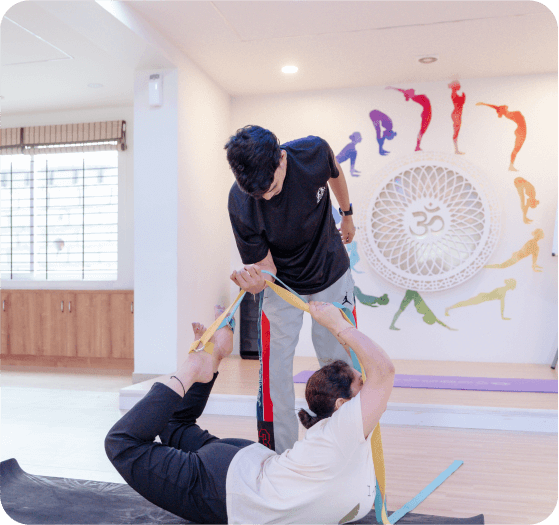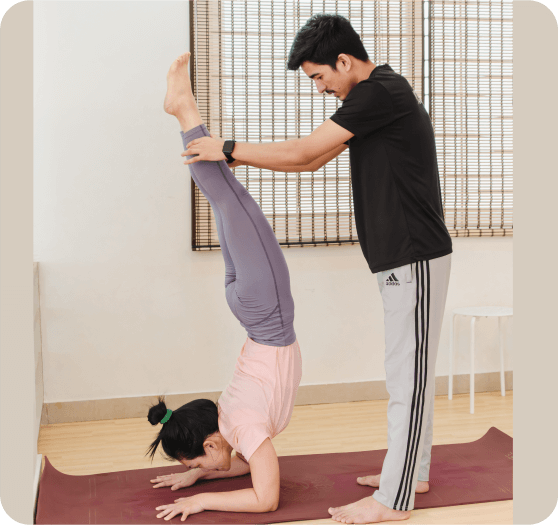
Our Therapeutic Personal Training program offers a personalized approach to healing through yoga. It is designed to address specific health issues, chronic pain, injuries, and imbalances in the body. Whether you are recovering from an injury, managing a health condition, or simply seeking personalized care for your well-being, this program combines the therapeutic aspects of yoga with one-on-one attention to support your physical and emotional healing.







Therapeutic Personal Training combines elements of traditional personal training with a focus on rehabilitation, injury prevention, and addressing specific physical limitations or health conditions. It’s designed to help clients recover from injuries, improve movement, and manage chronic conditions through customized exercises and targeted techniques.
Unlike standard personal training, which primarily focuses on general fitness goals such as strength, endurance, or weight loss, Therapeutic Personal Training emphasizes addressing specific health issues or injuries. The trainer may use a combination of corrective exercises, mobility work, strengthening, and flexibility training to support recovery, alleviate pain, and prevent future injuries.
Therapeutic Personal Training is ideal for individuals recovering from injury, surgery, or dealing with chronic conditions like arthritis, back pain, or joint issues. It is also helpful for those who experience muscle imbalances, postural problems, or limited mobility. This approach is also beneficial for older adults, athletes looking to recover or prevent injury, and anyone with a specific therapeutic need.
It’s always a good idea to check with your healthcare provider before starting any new exercise program, especially if you have an injury, health condition, or are recovering from surgery. A doctor’s clearance may be required for certain conditions, but in many cases, your personal trainer can work in collaboration with your healthcare provider to ensure you’re training safely.
Therapeutic Personal Training can help with a wide range of conditions, including but not limited to:
The goal is to work on correcting movement patterns and strengthening areas that may be weak or imbalanced to reduce pain and prevent further injury.
Each session is highly individualized and starts with an assessment to determine your current physical condition and any limitations. A typical session may include:
Your trainer will tailor each session to your specific goals, capabilities, and therapeutic needs.
Therapeutic Personal Training should not be painful, although it may involve some discomfort, especially if you are addressing chronic pain or injury recovery. The goal is to work within your comfort level while progressively improving mobility, strength, and function. If you experience pain during any exercise, it’s important to let your trainer know immediately so they can modify the movements to suit your needs.
The timeline for results depends on the nature of your condition, your commitment to the training plan, and your body’s ability to respond to therapy. For many clients, noticeable improvements in pain relief, mobility, and strength can be felt within a few weeks, but full rehabilitation or recovery may take several months, depending on the injury or condition. Consistency and follow-through with the exercises are key.
Yes! Therapeutic Personal Training can have positive effects on mental health. Physical exercise releases endorphins, which can help reduce stress, anxiety, and depression. Moreover, addressing chronic pain and improving physical function can enhance mood, improve self-esteem, and contribute to a sense of well-being.
A Therapeutic Personal Trainer typically has specialized certifications in personal training, as well as additional training in rehabilitation, corrective exercise, or therapeutic techniques. Many trainers also have backgrounds in physical therapy, exercise science, or kinesiology. It’s important to work with a trainer who understands both fitness and therapeutic techniques to ensure safe and effective progress.
Therapeutic Personal Training can complement physical therapy by continuing the work done in a clinical setting and helping to transition clients to a more independent, sustainable exercise program. If you’re working with a physical therapist, your personal trainer can collaborate with them to ensure that the exercises and movements align with your recovery plan. Often, trainers and physical therapists work together to optimize rehabilitation.
The length of your therapeutic training program depends on your goals and the specific condition you’re addressing. Some clients may benefit from just a few weeks of therapy to correct posture or strength imbalances, while others may need longer-term sessions to recover from an injury or manage a chronic condition. Your trainer will work with you to create a plan that fits your needs and adjust as you progress.
Yes, many clients continue Therapeutic Personal Training after recovery to maintain physical health, prevent re-injury, and stay strong and mobile. Once recovery is complete, your trainer can help shift the focus to general fitness or more performance-based goals, depending on your interests and needs.
During your sessions, expect your trainer to provide personalized instruction, ensure proper technique, and guide you through exercises with an emphasis on safety. They will regularly check in with you to assess how you’re feeling and adjust the program as necessary. Your trainer will also educate you on the mechanics of your body and empower you with tools and exercises to improve your condition independently.
Absolutely! Even if you don’t have a current injury, Therapeutic Personal Training can help improve your overall movement, flexibility, and strength, reduce the risk of injury, and enhance your quality of life. It’s great for improving posture, preventing musculoskeletal imbalances, and optimizing physical performance.
Our mission is to empower individuals of all ages and fitness levels to embark on a journey of self-discovery, inner peace, and physical strength.
Copyright © 2024 Ujjayi Yoga Fitness | All Rights Reserved | Made By Think Venky Studio
WhatsApp us